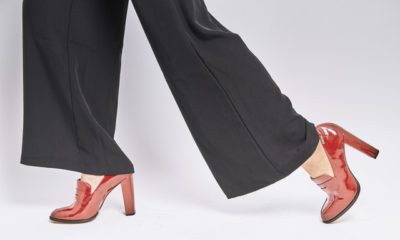Features
Adefolake Adekola: How to Deal with the Harmattan Season

It started off with my lips cracking. Then my skin began to feel dry. But I think the real sign was when the soles of my feet started peeling off; I knew harmattan season was upon us. I noticed the change in the weather when I felt cold in the early hours of the morning and the environment was foggy. The harmattan season in Nigeria – and West Africa – usually commences from November up until March of the next year. During this period, we not only experience cracked lips or dry skin but so many other side effects that make this period dreadful for some.
Some people experience nose bleeds, increased asthma attacks, skin allergies and irritation, dehydration, eye redness and irritations, sore throats, cough and catarrh, and other respiratory problems. According to B.N Okeahialam, weather patterns play a significant role in hypertension and other cardiovascular diseases as blood pressure tend to rise this period. Habits people engage in this period, like smoking and drinking alcohol – which are believed to keep people warm – also lead to other cardiovascular diseases over a long period of time. This season is also notorious for causing obesity as people tend to eat more because we have longer nights and shorter days. Infection is also on the rise as the respiratory tract is dry of mucus, this weakens the body defense system and can lead to various health problems.
During this period, the environment also goes through its own struggles as the level of air pollution is second to none. Because of the dusty environment during harmattan, road accidents and fire outbreaks are more likely to occur.
How to deal with the Harmattan Season
Body Care
Drink a lot of water to stay hydrated this period. Eat more fruits and vegetables – they are a great source of vitamins for the body. Doing this will keep the body rejuvenated and boost the immune system.
Skin Care
This is the time to get moisturizers out. Whether you like to cream your body or not, you need to keep your skin moisturized. It is advisable to wear more clothing this period to prevent the skin from drying up or from experiencing cracks, and to keep warm from the cold.
Eye Care
Due to the dust and other particulate matter that usually move around, it is advisable to use sunshades when necessary to prevent dust from entering the eye.
Nose Care
COVID-19 already forced us into wearing nose masks but it is also a good opportunity to protect our nostrils from the dust particles, especially when going to places prone to dust or when in a moving vehicle and the windows are down. So wear your masks regularly.
Home Care
It is advisable to keep your windows and doors closed this period. This is to minimize the level of dust and particulate matter one is exposed to. Sprinkle water on the floor before sweeping a dusty floor or wiping a surface.
Health Care
Asthmatic patients should keep their inhalers close to them throughout this season and not neglect any warning signs of an attack. The same for people living with sickle cell. People living with sickle cell are susceptible to having a crisis this period because of the cold weather, so it’s better for them to take caution and protect themselves at all costs.
Environment Care
Avoid bush burning during this period and prevent exposure to flammable materials. Motorists are also advised to park if the visibility level is low and use their headlamps when necessary.
Y.O.L.O – You Only Live Once – make it count!
***
Photo by Oleg Magni from Pexels






















